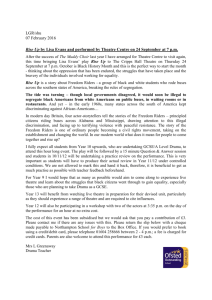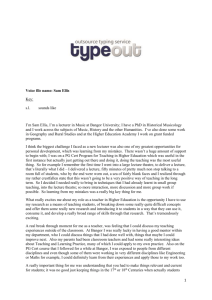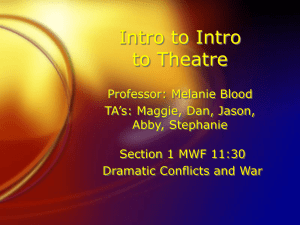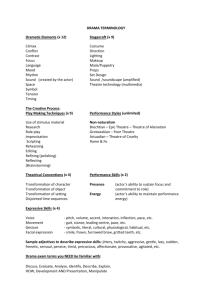Additional Programme Guidelines for English
advertisement
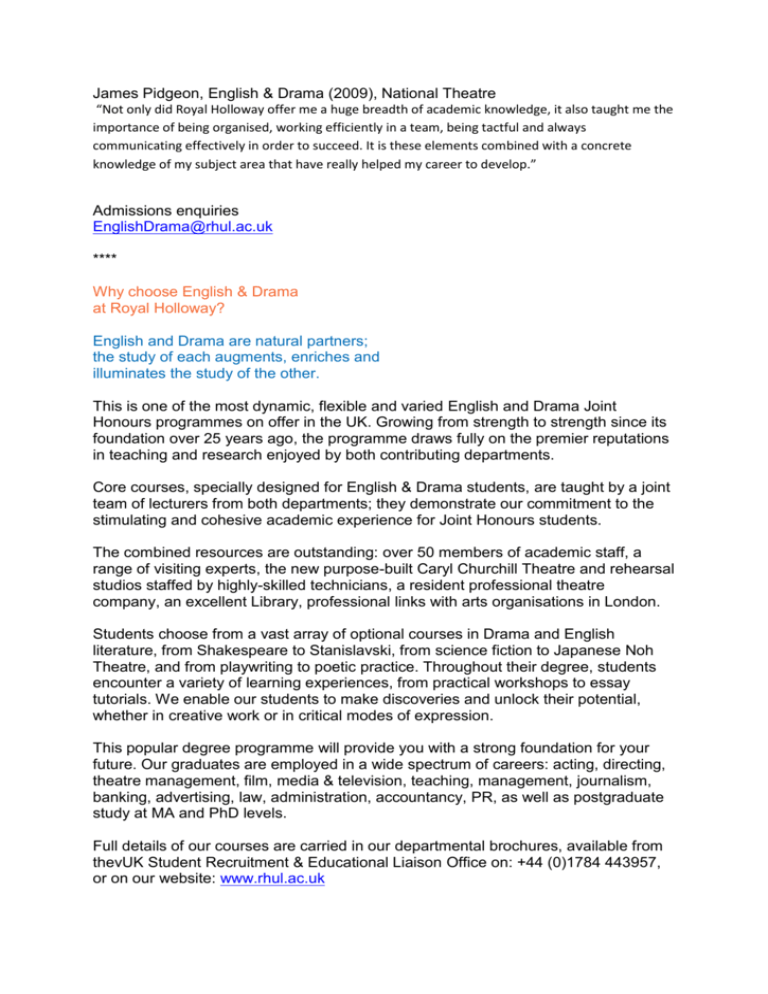
James Pidgeon, English & Drama (2009), National Theatre “Not only did Royal Holloway offer me a huge breadth of academic knowledge, it also taught me the importance of being organised, working efficiently in a team, being tactful and always communicating effectively in order to succeed. It is these elements combined with a concrete knowledge of my subject area that have really helped my career to develop.” Admissions enquiries EnglishDrama@rhul.ac.uk **** Why choose English & Drama at Royal Holloway? English and Drama are natural partners; the study of each augments, enriches and illuminates the study of the other. This is one of the most dynamic, flexible and varied English and Drama Joint Honours programmes on offer in the UK. Growing from strength to strength since its foundation over 25 years ago, the programme draws fully on the premier reputations in teaching and research enjoyed by both contributing departments. Core courses, specially designed for English & Drama students, are taught by a joint team of lecturers from both departments; they demonstrate our commitment to the stimulating and cohesive academic experience for Joint Honours students. The combined resources are outstanding: over 50 members of academic staff, a range of visiting experts, the new purpose-built Caryl Churchill Theatre and rehearsal studios staffed by highly-skilled technicians, a resident professional theatre company, an excellent Library, professional links with arts organisations in London. Students choose from a vast array of optional courses in Drama and English literature, from Shakespeare to Stanislavski, from science fiction to Japanese Noh Theatre, and from playwriting to poetic practice. Throughout their degree, students encounter a variety of learning experiences, from practical workshops to essay tutorials. We enable our students to make discoveries and unlock their potential, whether in creative work or in critical modes of expression. This popular degree programme will provide you with a strong foundation for your future. Our graduates are employed in a wide spectrum of careers: acting, directing, theatre management, film, media & television, teaching, management, journalism, banking, advertising, law, administration, accountancy, PR, as well as postgraduate study at MA and PhD levels. Full details of our courses are carried in our departmental brochures, available from thevUK Student Recruitment & Educational Liaison Office on: +44 (0)1784 443957, or on our website: www.rhul.ac.uk Admissions and entry requirements Our standard offer is ABB with an A in English. Equivalent offers will be made for all other appropriate forms of qualifications (IB, Highers etc) or overseas qualifications. We welcome mature students who are coming to higher education from alternative routes. Applications for entry to all our full-time undergraduate degrees must be made through the Universities and Colleges Admissions Service (UCAS). To make an application you will need a UCAS application form and directory. Your school or college should have these materials, otherwise you can write, after 1 August, to UCAS Enquiries, UCAS, PO Box 28, Cheltenham, GL52 3LZ; call +44 (0)870 1122211; or visit the UCAS website at: www.ucas.com The UCAS form requires an institution code and a course code. The institution code for Royal Holloway is R72, RHUL. The course code for English & Drama is QW34. All students applying to this degree are encouraged to attend one of the College’s UCAS Open Days and to visit both departments, meet teaching staff and students and see the College for yourself. Open Day dates and details can be found on the College website at: www.rhul.ac.uk Typical offers ABB at A-level, normally with A in English Literature. A2 Theatre Studies desirable but not essential. [Please note that General Studies at A-level is not acceptable as one of our A-level requirements.] 35-36 points at IB including a 6 in English at higher level. Theatre Studies preferred but not essential. Equivalent offers will be made for all other appropriate forms of qualifications (Highers, BTEC etc) and for overseas qualifications. Alternative qualifications Special consideration is given to mature applicants and students without a conventional educational background. We look favourably, for example, upon students who are returning to study through an Access course. We also consider all appropriate overseas qualifications. Overseas applicants are expected to have considerable proficiency in the English language; the minimum levels we usually consider are an IELTS score with minimum sub-scores of 7, or a TOEFL score of 570. ***** Degree structure This is a joint degree course, so students will take two units of English each year, and two units of Drama. These are organised as follows: Year 1 First years undertake a foundation year that is designed to equip them with the skills and knowledge we consider fundamental to the combined study of English and Drama. Students take two units in each department, and study alongside single honours students. These courses focus on the acquisition of the theoretical, practical and methodological skills necessary to develop a sophisticated understanding of the subject. Courses in the English Department will introduce students to the study of the novel and to the study of poetry. The foundation course in Drama offers creative and critical approaches to the study of drama, and introduces students to the practical elements of theatrical performance. First year courses: Inventing the Novel Introducing English Poetry Theatre and Performance-making 1 Theatre and Ideas 1 In addition, students will also take part in a series of Foundation Tutorials. Working in small groups with their personal tutor, they will learn a range of essential skills for making the transition from school to university. Year 2 In the second year students start to specialise, making their course choices based around the interests which they have formed in first year. Students work with staff from both the English and Drama department on a Shakespeare course specially designed for English & Drama students. Alongside this they take one and a half units in the Drama department from a wide range of courses listed under the umbrella themes of Theatre and Performance-making 2 and Theatre and Ideas 2; in English they choose one and a half units from the full menu of options offered to all English students. Second year courses: Shakespeare, Page to Stage 1.5 units from a range of English options 1.5 units from a range of Drama options listed under Theatre and Performance-making 2 Theatre and Ideas 2 Year 3 In third year, students develop their own expertise. They take part in the dedicated English Drama Research Seminar led by staff from both departments. Themes vary from year to year according to the staff team. Recent examples have included: Peter Pan: An Awfully Big Adventure; Nation/ Adaptation; Sound and Movement in Old English Poetry; Dislocating Shakespeare; Pop: Text and Performance. Alongside this, students choose a total of three units from the wide range of whole and half unit options offered by both departments. This should include ONE of the following: Special Author (one unit) Special Topic (one unit) Dissertation (one unit) Methods and Processes with Final Year Project (two units). This framework thus offers ample opportunity for students to pursue their developing interests and specialisms in both English and Drama in their third year of study. Third year Courses: English Drama Research Seminar ONE of the following: Methods and Processes with Final Year Project (two units) Special Author (one unit) Special Topic (one unit) Dissertation (one unit) ONE or TWO units, as required, from the range of options available in the Drama and/or English Departments. Teaching and Assessment The basic teaching session is usually two or three hours long. During that time there may be a formal lecture or a screening, followed by small-group discussions, seminars and practical workshops. Alternatively, students may work co-operatively for the whole teaching session on practical and theoretical projects. Independent research is presented, ideas are developed, texts are read and their problems and challenges tested. A full and varied range of assessment techniques is used. We predominantly employ assessed essays, written as part of the work in each course; dissertations; practical presentations and performances of all kinds; and a small number of formal unseen examinations. Classes typically consist of about 15–18 students. Each student is assigned to a Personal Tutor, with whom they maintain contact for the duration of the programme. The role of the Personal Tutor is to be the first point of contact should queries or difficulties arise concerning a student’s participation in their programme of study. Other Information Facilities The beautiful Royal Holloway campus is the focal point of student life and is home to an impressive range of modern facilities. The Departments of Drama and English occupy five substantial buildings in the heart of the campus, encompassing four theatres, rehearsal spaces, extensive IT facilities, a digital studio and a design studio. The College’s excellent Library and Computer Centre are also close to hand. In addition to the campus in Egham, the College has a well-equipped building at Bedford Square in central London which provides an important teaching facility. Study abroad There are opportunities for students to study abroad during their time at Royal Holloway. Studying abroad is a great opportunity to develop new skills and experience student life in a new environment. A period of study outside the UK will also provide you with the opportunity to: � Broaden your academic knowledge � Enhance your CV and ensure you stand out from the crowd at interview � Immerse yourself in a different culture � Interact with students from around the world � Travel and explore new surroundings For more information and contact details, visit the Study Abroad & Student Exchange website at: www.rhul.ac.uk/studyhere/international Students wishing to take advantage of these opportunities should consult the relevant contacts in both departments. Career opportunities Royal Holloway has an excellent Careers Service available to all students from the day they arrive. Both departments run internship programmes in which second and third year students apply and take part in a rigorous selection process. Graduates from this programme enter a wide variety of careers such as acting, directing, theatre management, film, media & television, teaching, management, journalism, website creation, law, administration, accountancy, PR, as well as further postgraduate study to MA and PhD levels. Our Academics Department of Drama and Theatre Melissa Blanco Borelli, BA (Brown University) MA (University of Southern California), PhD (UC Riverside) Senior Lecturer in Dance Teaching areas include: · dance history and theory · devising for dance theatre · performance ethnography · critical (race) theory and philosophy Emma Brodzinski, BA (Lancaster), PGDip (Roehampton), MRes, (London), PhD (London) Senior Lecturer in Drama and Theatre Teaching areas include: • live art • theatre and therapy • theatre and health • devising Matthew Isaac Cohen, AB (Harvard), PhD (Yale) Professor of International Theatre Teaching areas include: • Southeast Asian performing arts • puppet theatre and object performance • cross-cultural and transnational performance Emma Cox, BA (Canterbury, NZ), MPhil (Queensland), PhD (ANU) Lecturer in Drama and Theatre Teaching areas include: • Australian and New Zealand theatre, film and activism • Asylum and migration • Museology, indigeneity and repatriation • Family history Helen Gilbert, BA (British Columbia), PhD (Queensland) Professor of Theatre Teaching areas include: • Australian theatre and film • postcolonial theatre • theatre in the Americas Lynette Goddard, BA, MRes, PhD (London) Senior Lecturer in Drama and Theatre Teaching areas include: • black and Asian theatre and performance • staging race on the British stage from the renaissance to the present • gender, race and sexuality in film, theatre and television • contemporary productions of Shakespeare on stage and screen Bryce Lease, BFA (Emerson), MPhil (Trinity College, University of Dublin), PhD (Kent) Lecturer in Drama and Theatre Teaching areas include: • performance studies • contemporary European theatre • gender and sexuality • political theatre Dick McCaw, MA (Cambridge), PhD (University of London) Senior Lecturer in Drama and Theatre Teaching areas include: • physical theatre • contemporary theatre practitioners • practical skills in theatre Chris Megson, BA (Hull), MPhil (Glasgow), PhD (London) Senior Lecturer in Drama and Theatre Teaching areas include: • Contemporary theatre: politics and philosophy • Post-war British theatre • Naturalist and fin-de-siècle theatre • Group Performance. Helen Nicholson, BA (London), PGCE (Bristol), PhD (Warwick) Professor of Theatre and Performance Teaching areas include: • theatre education • performance of memory and museum theatre • theatre and cultural practices • theatre for young audiences Sophie Nield, BA, PhD (Manchester) Senior Lecturer in Drama and Theatre Teaching areas include: • European modernist theatre • place, space and performance • historiography and critical theory • film studies Dan Rebellato, BA (Bristol), PhD (London) Professor of Contemporary Theatre, Head of Department Teaching areas include modern and contemporary British and European theatre playwriting critical theory and philosophy Elizabeth Schafer, BA, PhD (London), PGCE (Nottingham), MA (Birmingham) Professor of Drama and Theatre Studies Teaching areas include: • Shakespeare in performance • Renaissance drama • Australian drama and theatre Ashley Thorpe, BA, PhD (London) Lecturer in Drama and Theatre Teaching areas include: actor training methods in East Asian theatre casting and theatrical representation intercultural performance research through practice Caroline Wake BA, PhD (UNSW, Australia) Lecturer in Drama and Theatre Teaching areas include: Australian theatre, performance and visual culture theatres of the real, including testimonial, tribunal and documentary theatre theatre, performance and media theories of spectatorship David Williams, BA & MA (Kent), PhD (Plymouth/Dartington) Professor of Performance Practices Teaching areas include: Devising, collaborative performance-making practices Directing Dramaturgy Libby Worth, BA, MA (Surrey), PhD (London) Senior Lecturer in Theatre Practice Teaching areas include: Choreographic practices Physical theatre and dance drama Performer training and performance making Site specific performance TIM ARMSTRONG, BA, MA (Canterbury, NZ), PhD (London) Professor of Modern English and American Literature Head of Department Teaching and research areas include: modernism and modernity American literature and culture literature and technology the poetry of Thomas Hardy ALASTAIR BENNETT, MA, MPhil, PhD (Cantab) Lecturer in Medieval English Teaching and research areas include: Piers Plowman Middle English sermons and devotional texts rhetoric and persuasion Chaucer ROY BOOTH, BA (Oxon), PhD (London) Senior Lecturer in Renaissance English Teaching and research areas include: early modern poetry John Donne and his circle witchcraft and early modern drama broadside ballads and the popular theatre BARRIE BULLEN, MA, MPhil, PhD (Cantab) Professor of Victorian Literature Teaching and research areas include: Thomas Hardy Pre-Raphaelitism the relationship between the arts in the long 19th century CHRISTIE CARSON, BA (Queen’s Canada), MA (Toronto), PhD (Glasgow): Reader in Shakespeare in Performance Teaching and research areas include: performance history of Shakespeare Shakespearean adaptation the use of digital technology in teaching and research intercultural performance DOUGLAS COWIE, BA (Colgate University, New York) MA, PHD (University of East Anglia) Senior Lecturer in Creative Writing Teaching and research areas include: fiction writing American poetry and fiction of the 20th Century The links between writing and music Nelson Algren ROBERT EAGLESTONE, BA (Manchester), MA (Southampton), PhD (Wales) Professor of Contemporary Literature and Thought Teaching and research areas include: contemporary and 20th-century literature literary theory and philosophy Trauma studies the Holocaust and genocide FINN FORDHAM, MA (Cantab), PhD (London) Reader in 20th-century Literature Teaching and research areas include: James Joyce modernism French 19th-century influences within modernism 20th-century literary manuscripts ANDREW GIBSON, MA, DPhil (Oxon) Professor of Modern Literature and Theory Teaching and research areas include: postmodernism narrative theory James Joyce and Samuel Beckett Irish Literature and its European contexts SOPHIE GILMARTIN, BA (Yale), PhD (Cantab) Reader in Victorian Literature Teaching and research interests include: 19th-century literature and visual arts 19th-century maritime studies mourning and wedding rituals ideas of ancestry and nationhood VICKY GREENAWAY, MA, PhD (London) Lecturer in 19th-century Literature Teaching and research interests include: Victorian literature Literature and the arts in the 19th century the ideal and the real in 19th-century poetics ROBERT HAMPSON, BA (London), MA (Toronto), PhD (London) Professor of Modern Literature Teaching and research interests include: Joseph Conrad 19th- and 20th-century literature contemporary English and American poetry creative writing PROFESSOR JUDITH HAWLEY, BA (Cantab), DPhil (Oxon) Professor of 18th-century Literature Teaching and research interests include: 18th-century literature and thought Laurence Sterne 18th-century women writers 18th-century private theatricals and amateur performance DR BETTY JAY, BA (Southampton), PhD (London) Senior Lecturer in 20th-century Literature Teaching and research interests include: 20th-century literature gender contemporary literature war writing JULIET JOHN, BA (Cantab), PhD (London) Hildred Carlisle Professor of English Teaching and research interests include: Charles Dickens Victorian literature and culture Victorian popular culture Film adaptation and Heritage culture SUSANNA JONES BA (London), MA (Manchester) Senior Lecturer in Creative Writing and Practice-based Research Teaching and research interests include: Fiction writing The contemporary novel Practice-based research KRISTEN KREIDER BA (Indiana) MA (Arizona) PhD (London) Reader in Poetry & Poetics Teaching and research interests include: Poetry and poetics Contemporary poetry and text-based art Poetics and place Creative writing RUTH LIVESEY, BA (Oxon), MA, PhD (Warwick) Reader in 19th-century Literature and Thought Teaching and research interests include: Victorian literature gender, politics and the history of ideas in 19th-century culture urban exploration 19th-century travel, communications and literature ELAINE McGIRR, BA (Rochester, New York), MA, PhD (Washington, St Louis) Senior Lecturer in English and Drama Teaching and research interests include: Restoration and 18th-century drama Celebrity and the 18th-century cultural marketplace the performance of masculinity the realities and representation of early modern maternity BEN MARKOVITS, BA (Yale), MPhil (Oxon) Reader in Creative Writing Teaching and research interests include: Creative writing The Romantics Sport and writing MARK MATHURAY, BA (Witwatersrand, SA), MA (Sussex), PhD (Cantab) Lecturer in Contemporary Literature Teaching and research interests include: African literatures postcolonial studies in literature and culture modernism dissident sexualities and literary theory KEI MILLER, BA (West Indies), MA (Manchester Metropolitan), PhD (Glasgow) Lecturer in Creative Writing Teaching and research interests include: Creative writing Contemporary poetry the novel and the short story WILL MONTGOMERY, BA (Cantab), MA (London) Senior Lecturer in Contemporary Literature Teaching and research interests include: contemporary American poetry modernist literature contemporary poetry and poetics sound, art and literature. SIR ANDREW MOTION, BA, MA, M Litt (Oxon), D.Litt (Aberdeen, Anglia, Brunel, Chester, Hull, Exeter, Open, York St John), FRSL. Professor of Creative Writing Teaching and research interests include: Romantic poetry 20th-century and contemporary poetry Poetry and the environment creative writing CATHERINE NALL, BA, MA, PhD (York) Senior Lecturer in Medieval Literature Teaching and research interests include: Medieval literature, particularly Malory and Lydgate politics and chivalry in literature translation theory and practice manuscript and early print cultures JENNIFER NEVILLE, BA (Alberta), MA (Toronto), PhD (Cantab) Reader in Anglo-Saxon Literature Teaching and research interests include: Anglo-Saxon literature Beowulf JRR Tolkien’s use of Old English Literature Old English riddles in the Exeter Book REDELL OLSEN, BA (Camb), MA (Staffs), PhD (London) Reader in Poetic Practice Teaching and research interests include: avant-garde modernist and contemporary poetics visual arts and poetry feminist theory and writing practice contemporary fiction DEANA RANKIN, MA (Ulster), MA, DPhil (Oxon) Senior Lecturer in Renaissance Literature Teaching and research interests include: Shakespeare in performance and on film Renaissance and 17th-century drama Irish literature, particularly drama classical republicanism in early modern France and Britain ADAM ROBERTS, MA (Aberdeen), PhD (Camb) Professor of 19th-century Literature Teaching and research interests include: 19th-century Literature (particularly poetry) Science fiction and fantasy postmodernism creative writing KIERNAN RYAN, BA, MA (Cantab), PhD (Amsterdam) Professor of English Language and Literature Teaching and research interests include: Shakespeare Renaissance literature literary theory, particularly New Historicism and Cultural Materialism Ian McEwan and modern British fiction JO SHAPCOTT: MA (Trinity College, Dublin), BA (Oxford) Professor of Poetry Teaching and research interests include: Creative writing and practice poetry and the body poetry and science poetry and the environment KATE WILLIAMS MA (London), MA, DPhil (Oxon) Lecturer in Creative Writing Teaching and research interests include: life writing the 18th and 19th centuries and social history public history and engagement royal and constitutional history AGNES WOOLLEY MA (SOAS), BA, PhD (Leeds) Lecturer in 20th-century Literature Teaching and research interests include: contemporary literature and film migration, diaspora, and writing postcolonial theory and writing ecocriticism ANNE VARTY, MA (Glas), DPhil (Oxon) Professor of Victorian Literature Teaching and research interests include: Victorian literature especially Pater, Wilde and Aestheticism Children and Victorian theatre modern and contemporary British and European Drama Liz Lochhead and contemporary poetry



